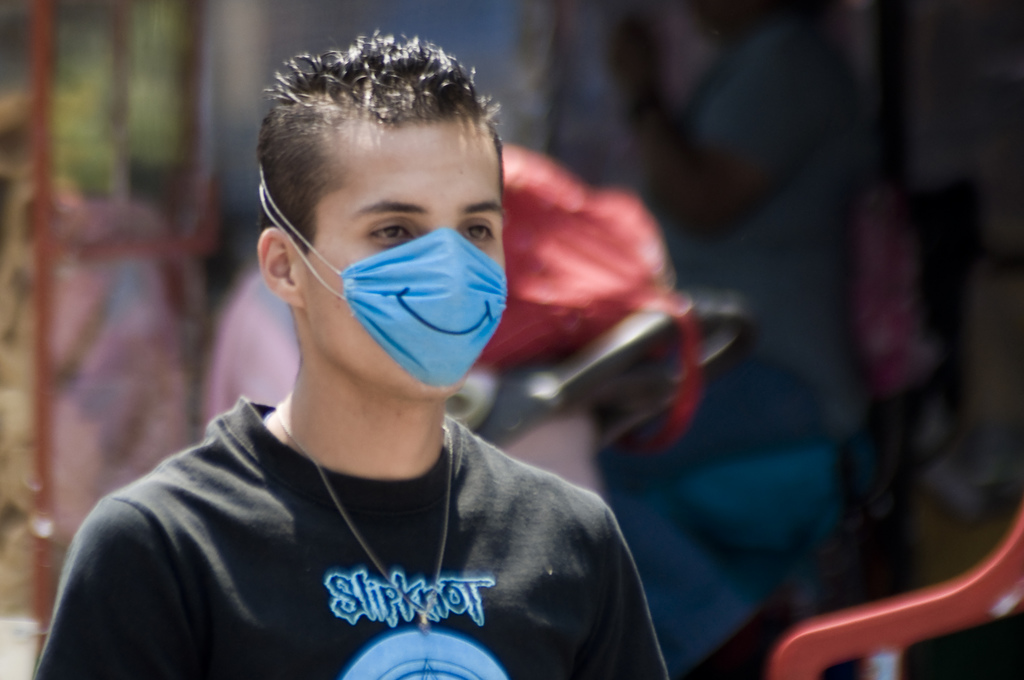 To get the needle or not, that is the question some of us are asking. A researcher looking at bacteria model, says these ancient organisms wouldn’t mass immunize.
To get the needle or not, that is the question some of us are asking. A researcher looking at bacteria model, says these ancient organisms wouldn’t mass immunize.
The swine flu is taking its toll in the Middle East, not immune to the deadly virus that tends to attack younger, healthier people, and those who are pregnant. (For other reasons, it’s also decimated the pig population in Cairo, which had been composting the city’s organic waste.)
In America, and Canada, large numbers of people are opting for the swine flu shot – to be on the safe side.
Yet, in countries like Israel, where the swine flu shot is now being offered, only a small part of the population is opting for protection, mainly healthcare workers. According to an Israeli researcher, only those people who are networked in public positions, or who contact many people in a day or in the week, should be immunized. Because there could be other risks by getting the shot, which has yet to be proven safe over the long term. Looking at the model of bacteria behaviour, here’s more on the research.
Bacteria inhabited our planet for more than 4 billion years before humans showed up, and they’ll probably outlive us by as many eons more. That suggests they may have something to teach us. New research from Tel Aviv University bacteria expert Prof. Eshel Ben-Jacob of the Raymond and Beverly Sackler School of Physics and Astronomy, grounded in the study of bacteria, presents compelling evidence to suggest there may be good reasons why most people should not automatically opt for the swine flu H1N1 shot.
In research published in the Proceedings of the National Academy of Science (PNAS), Prof. Ben Jacob uses the decision-making of bacteria, an analogue of “game theory,” as a model to make his case.
“Unlike our health authorities, bacteria would never panic,” he says. “Bacteria don’t follow the media or watch cable news. Instead, they send chemical messages to each other — in a colony 100 times larger than the earth’s human population — to make their decisions. And based on what we’ve seen in bacterial colonies, I know they would be suspicious committing to swine flu shots. They wouldn’t opt for a colony wide vaccination,” Prof. Ben Jacob concludes.
The prisoner’s dilemma
The new research, done in collaboration with Dr. Daniel Schultz, a postdoctoral fellow at TAU, and Profs. José Onuchic and Peter Wolynes at the University of California/San Diego, not only provides a paradigm for assessing responses to health emergencies, it may also provide investors with insight into how to manage stock portfolios.
In the PNAS paper, the scientists explored how microscopic creatures living in large colonies decide their fate in adverse times under complicated and life threatening conditions. They found that bacteria communicate through chemical signals and reach decisions in sophisticated ways, using an elaborate network of genes and proteins to calculate complex possibilities, as in game theory.
In essence, in life or death situations, bacteria employ more advanced tactics than those used to solve the classic problem known as “the prisoner’s dilemma.” This may account for their colony’s resilience. In the classic problem, two prisoners are asked to betray each other. If one testifies against the other and the other remains silent, the betrayer goes free and the silent one (the prisoner loyal to his friend), will get 10 years in prison. If both remain silent (and cooperate with each other), they are sentenced to only one year in jail. If each one betrays the other, both will be sentenced to 5 years in jail. The temptation, of course, is to betray — but neither prisoner can be sure what the other will say, and could risk five years in jail.
In the case of bacteria, there are not two but hundreds of billions of participants with a limited time to decide whether to deal with a stress situation by all turning into spores. Each bacterium has to decide whether it will cooperate or not. Unlike the prisoners, there is a clock ticking away. And each bacterium must quickly send out chemical messages to its peer cells about its intentions.
Bacteria “usually don’t lie” about their own plans, Prof. Ben Jacob says, but the minority that do have a chance of surviving won’t cheat to postpone the decision of others. The scientists’ new article presents a model that decodes how bacteria use the gene-and-protein networks to calculate risks and the game theory principles they employ.
Maintaining a delicate balance
Americans uncertain about getting the H1N1 flu shot because they’ve heard about potentially dangerous side effects also face the prisoner’s dilemma. Perhaps it’s better not to get the shot, one may think, because if everybody else is vaccinated, the virus will be wiped out before it reaches me.
“The simple rule we learned from bacteria is that anybody who has to make an important decision — especially one of life and death at times of stress — should wait to see the trend of changes, process the risks and odds in depth, and only then decide,” says Prof. Ben-Jacob.
Based on what he and his colleagues learned about bacteria, he imagines that bacteria might offer this counsel regarding the flu shot: “They might suggest that only people who have widespread and intense contact with many others, such as business travellers and teachers, should get the shot. Those who are most likely to spread the virus should be vaccinated.
“Bacteria don’t take risks like we do and the results have paid off. They are super-successful, more than any creature on earth. They wouldn’t abuse the stock market, and would never invest beyond their means. I am also pretty sure most would not rush to get the flu shot, if given the choice,” he concludes. “They know how to keep a delicate balance.”
::AFTAU




The impact of swine flu is becoming more severe everyday.Flu viruses are spread mainly from person to person through droplets created while coughing or sneezing by a person infected with swine flu. Infected person may be able to infect others beginning one day before symptoms develop and up to seven or more days after becoming sick.Symptoms are similar to those of seasonal flu, and may include fever, sneezes, sore throat, coughs, headache, and muscle or joint pains.People seriously need to take precautions to prevent it because swine flu is a new virus and most people have no natural immunity.Ne ways i will keep looking around.Hope we will get out of this soon.
The impact of swine flu is becoming more severe everyday.Flu viruses are spread mainly from person to person through droplets created while coughing or sneezing by a person infected with swine flu. Infected person may be able to infect others beginning one day before symptoms develop and up to seven or more days after becoming sick.Symptoms are similar to those of seasonal flu, and may include fever, sneezes, sore throat, coughs, headache, and muscle or joint pains.People seriously need to take precautions to prevent it because swine flu is a new virus and most people have no natural immunity.Ne ways i will keep looking around.Hope we will get out of this soon.